Danny Weitzner – Privacy and policy: a new school of thought. Public Interest Tech

Transcript
Danny Weitzner: When I think of privacy, what I care about the most is really the question of chilling effect. And the challenge policy makers have now, and also people who design these new systems and platforms, is to understand when those platforms are behaving in ways that encourage social interaction and when they’re behaving in ways that discourage people from interacting politically, artistically, economically, that chills social interaction.
[Danny Weitzner, Online Privacy Expert, White House Deputy CTO for Internet Policy, 2011-2012, and Founder of the Center for Democracy and Technology. A white man wearing a gray suit and multicolored bowtie.]
My name is Danny Weitzner. I run the new MIT Internet Policy Research Initiative. We’re really in an era where the question of privacy is just fundamental. For four years now, MIT and Georgetown Law School have taught together a course on privacy, technology, and legislation. We bring together about 12 computer science students and 12 law students every year, and we present them with privacy technology challenges. That is, we say, “Look, there’s smart city technology developing now, which is going to keep track of where people are driving, the license plates of their cars, where they park, whether they pass a mosque or a church or a synagogue every day and get out on the way to work. What should be the privacy rules associated with that new set of smart city technologies?”
If you’re a lawyer, you might say, “OK, what laws apply?” And the answer would be, “Well, probably not many.” And then you get a little stuck, because you’re not quite sure what to do. If you’re a more technology-oriented person, a computer scientist, you look and say, “Wow, we can do all these cool things with all that data. We can learn all kinds of things about people. What can we do with that data? Well, we’re not really sure because we don’t really know what the rules are or what the rules should be.” We bring together these two worlds and try to figure out a solution. So, our challenge to groups of students that we get together every year is to understand the technology context really deeply so that we understand what the privacy risks are, what the privacy opportunities might be, what kinds of privacy protections could we possibly build into technology—to then actually develop a legislative proposal that could be brought to either state legislators or members of Congress.
[Photo of David Vladeck, a white man with gray hair, wearing a gray suit and striped purple tie, standing at a podium. His credentials appear: online privacy expert; Professor, Georgetown University Law Center; Director of the Bureau of Consumer Protection at the FTC, 2009-2012.]
When David Vladeck and I started this course, we thought we were teaching about privacy, technology, and law. What we’ve learned is that we’re teaching students an even more essential skill: how to be a public interest technologist—someone who can think deeply about the public policy questions that are raised by technology. What we know is that there is enormous demand for students who have training on both sides of this divide. We know that governments need students like this. We know that regulatory agencies, civil society organizations, and companies need students like this. All of us together as a society really have to be directly engaged in these public interest technology questions to make sure that we’re making the most of these new tools that we have in a way that really supports human values.
[This is tech at work for the public! Hashtag Public Interest Tech. Ford Foundation dot org forward slash tech. Ford Foundation logo: a globe made up of a series of small, varied circles.]
And if you like this video about public interest technology, watch the video about Joy and her incredible work on facial recognition and you’ll really understand the impact of this kind of training.
Accessibility Statement
- All videos produced by the Ford Foundation since 2020 include captions and downloadable transcripts. For videos where visuals require additional understanding, we offer audio-described versions.
- We are continuing to make videos produced prior to 2020 accessible.
- Videos from third-party sources (those not produced by the Ford Foundation) may not have captions, accessible transcripts, or audio descriptions.
- To improve accessibility beyond our site, we’ve created a free video accessibility WordPress plug-in.
Today, the issue of privacy is fundamental to our lives, and Danny Weitzner, founding director of the MIT Internet Policy Research Initiative, is fusing tech and humanities in a groundbreaking course on privacy technology. He challenges his students to find solutions to unanswered public policy questions raised by new technologies.
“All of us together, as a society, really have to be directly engaged in these public interest technology questions to make sure that we’re making the most of these new tools that we have in a way that really supports human values,” says Weitzner.
Policy makers and tech developers have a challenge to understand when systems are encouraging social interaction and when they’re prohibiting it. Weitzner aims to encourage the next generation—and the public at large—to think deeply about privacy in an era of rapidly changing technologies, as it expands into our homes, our cities, and beyond.
Danny Weitzner is part of a larger community that wants to see technology serve the greater welfare of society. We call this Public Interest Tech.
Other videos in this series
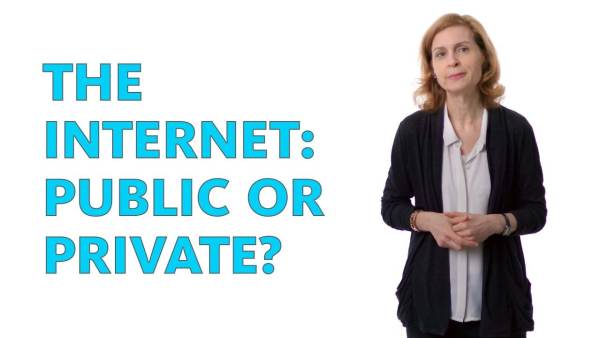
Susan Crawford – The internet: public or private? Public Interest Tech
Internet access is an indispensable factor when it comes to opportunities and resources needed for economic mobility. Public interest technologist Susan Crawford says government regulation is necessary to ensure provider incentives align with the public’s best interest and help create a better future for all.

Michelle Miller – A new age of advocacy. Public Interest Tech
Workers can use tools of the internet to push for better working conditions and outcomes, building a future of work that works for all. Michelle Miller, co-founder of coworker.org, focusses on building digital communities that put the power of numbers in the hands of the workforce.

Kade Crockford – Can computers discriminate? Spoiler alert: yes. Public Interest Tech
The age of automated decision making, through algorithms, can exacerbate inequalities in society. The ACLU’s Kate Crockford believes we need to bring technologists into the public interest fold to address this worrying issue. Lawyers like Crockford play an important part in ensuring digital technologies work for the benefit of all.

Joy Buolamwini – Fighting the “coded gaze:” How we make artificial intelligence benefit all. Public Interest Tech
The automation of how computers detect, classify, and identify faces can favor some races and genders over others and also deepen existing inequalities. Public interest technologist Joy Buolamwini is building tools to help researchers code in a more inclusive way.
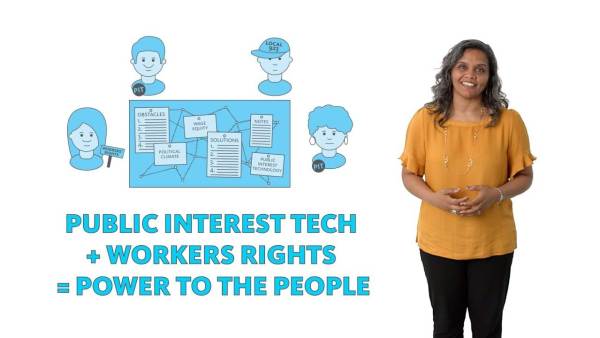
Sarita Gupta – The future of work(ers) rights! Public Interest Tech
Technology can help build a future of work that works for all. Sarita Gupta from Jobs with Justice explains how we can use technology to improve workers’ lives. Public interest technologists and social change leaders need to come together to design systems and tools that benefit all.
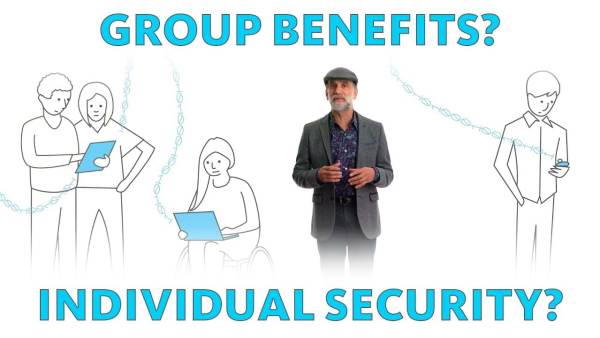
Bruce Schneier – How to survive in a hyperconnected world. Public Interest Tech
Cybersecurity expert Bruce Schneier says we need to find innovative ways to use surveillance data for the public good, while still maintaining our individual security. Tech decisions have policy ramifications, and policy decisions have tech ramifications—bridging the two worlds benefits everyone.
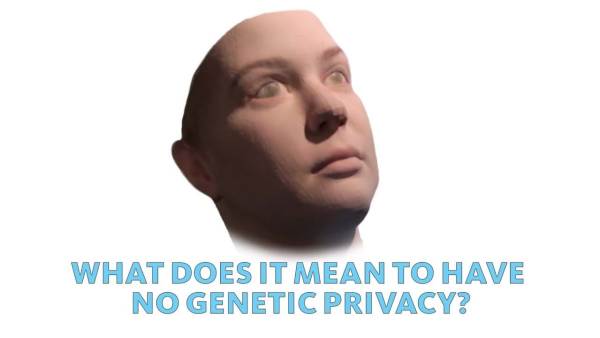
Heather Dewey-Hagborg – What can your genetic portrait tell the world? Public Interest Tech
Through her work, artist Heather Dewey-Hagborg asks deep questions about technology and how it functions and impacts society. She says we need to make the hidden world of biotechnology more visible to people, acknowledging its shortcomings and nuances to help ensure genetic privacy.
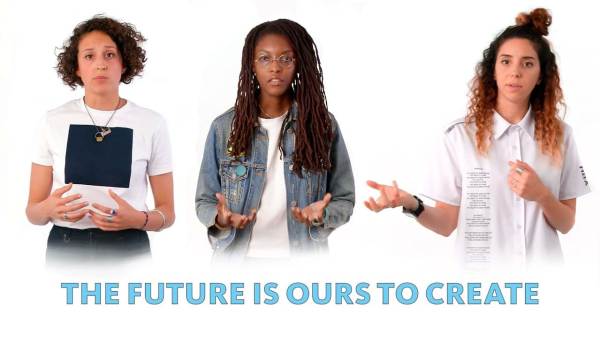
Hyphen-Labs – What does the future look like? Public Interest Tech
Technology can help us envision new ways of living. Artists can show us just what technology is capable of doing. But for tech to be truly inclusive, everyone needs to have a say in how it’s created. Artist collective Hyphen-Labs encourages experimenting with how we see the world.
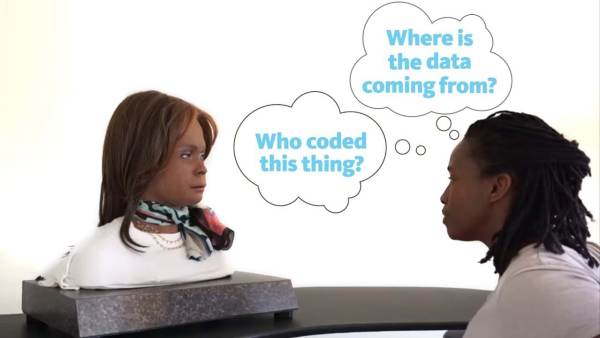
Stephanie Dinkins – Conversations with a robot. Public Interest Tech
There is implicit bias in artificial intelligence (AI). Artist Stephanie Dinkins wants data scientists and technologists to think about the ethical implications of AI and how better systems can be built for the future. Her work questions what machines are doing and why, so they can be more equitable and fair.
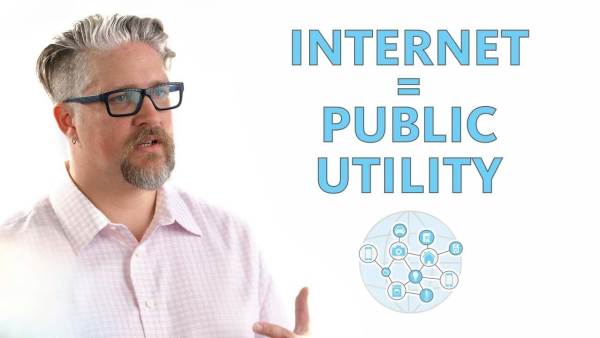
Éirann Leverett – Calling all hackers for good. Public Interest Tech
The internet is a shared safe space and should remain so. Éirann Leverett believes hacking can be used for public good. He maintains the issue of privacy and security should be seen as a consumer rights issue, and the internet should be treated as a public utility.
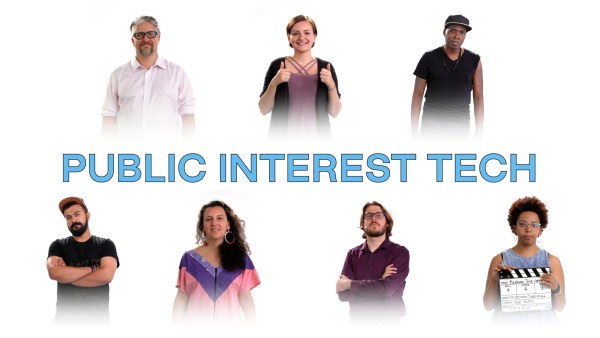
What is Public Interest Tech?
As it rapidly grows and changes our lives, technology can deepen existing inequalities in our world. For it to make a positive difference, public interest technologists work to ensure new and existing tech helps dismantle inequality and benefit the social good.
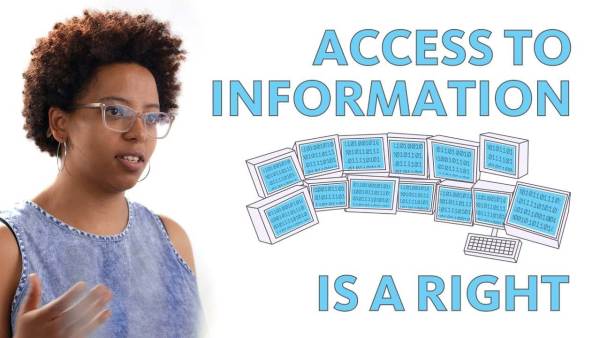
Berhan Taye Gemeda – Uncensored. Public Interest Tech
Censorship and online surveillance decrease opportunities for civic engagement. Social justice activist Berhan Taye Gemeda says access to the internet is a right, and she believes the internet should be governed by the public because it was created for the public. Accessible internet is essential for social change.
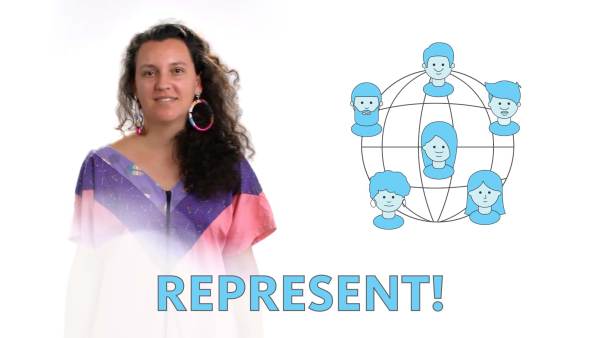
Steffania Paola Costa di Albanez – Who gets to make technology? Public Interest Tech
In the fight for equality, the way technology is developed should be a key issue. Open Web Fellow Steffania Paola Costa di Albanez says developers should reflect the diversity of those who use technology and represent a wide variety of user experiences, from women to Black women.
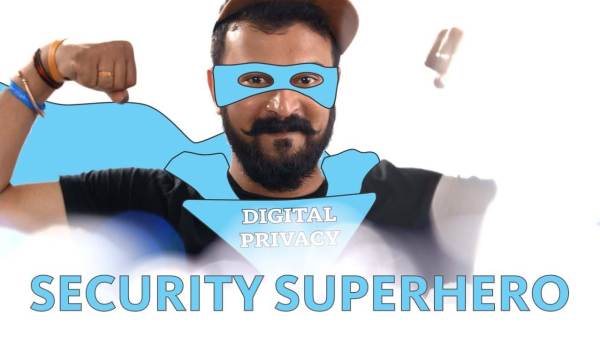
Sid Rao – My digital superpower. Public Interest Tech
Internet users don’t know how their metadata is being used or exploited for monetary or tracking purposes. Open Web Fellow Sid Rao aims to give people the tools to protect their digital privacy by knowing how their internet activities are being monitored.

Meet the future of tech. For good. Public Interest Tech
Public interest technologists show us how tech can work for social good and help fight inequality. They work to bridge the gap between what technologies are trying to build and what social scientists are trying to solve.
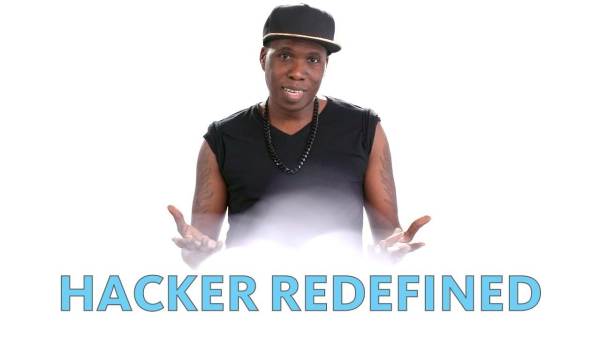
Matt Mitchell – I’m a hacker. For good. Public Interest Tech
Organizations need to be proactive in protecting themselves from digital threats. Hacker Matt Mitchell says it’s not a matter of if you will be hacked as an organization, it’s a matter of when. Having an understanding of these digital threats and planning before problems occur is vital.
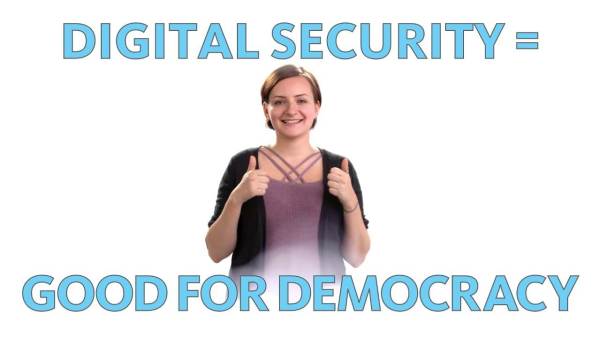
Jennifer Helsby – Digital security = good for democracy. Public Interest Tech
Having a free and open internet allows every person to read and speak freely online. Open Web Fellow Jennifer Helsby works to uphold freedom of the press and digital security, which are essential for journalists to maintain democracy.
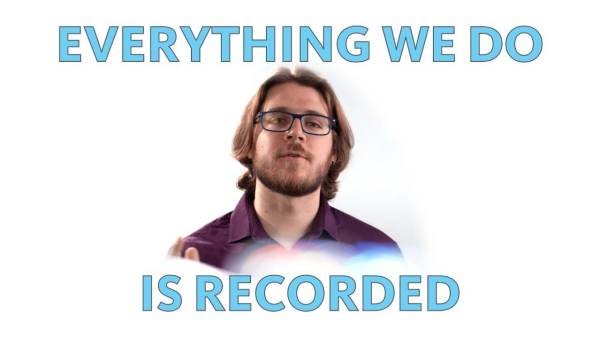
Etienne Maynier – Are these 5 tools in your organization’s digital security toolbox? Public Interest Tech
Fighting for a society that’s more equal means upholding the individual right to privacy. Etienne Maynier explains that digital surveillance is a pressing threat that feeds inequality. Protecting ourselves and our information is an important part of using technology to create a better society for all.